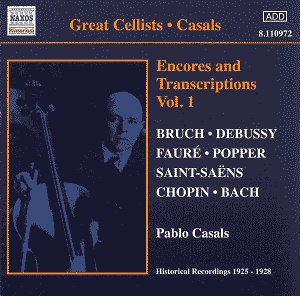The great string pioneers Pablo Casals and Lionel Tertis
were born on the same day and lived to a great age. They had another
thing in common – because they both claimed to have made recordings
around the turn of the twentieth century, Casals in Paris and Tertis,
on cylinder, in London. No traces have survived. Both happily lived
to make quite extensive numbers of discs, Casals beginning in 1915 when
he signed a contract with Columbia. A decade later, just before the
advent of electrical recordings, he joined Victor and the discs on this
Naxos CD, the first of two volumes, comprise the first fruit of that
Victor contract with encore and transcription material made between
1925 and 1928 – the final volume will take the series up to 1930. Two
of these, the MacDowell Romance and the Bruch Kol Nidrei
were unpublished on 78; this early performance of Schumann’s Träumerei
(the later one with Otto Schulhoff is the one more commonly studied,
because more popular) makes its first appearance since 1926 – it has
never been reissued in the intervening years. This conspectus of the
early electricals has been conspicuously well transferred by Mark Obert-Thorn
and we can hear Casals in all his multi-variegated glory with his highly
personalised vibrato usage and his almost vocalised ability to spin
legato phrasing over an extended span. Of course the programme as such
comprises mainly sweetmeats and trifles but such was the lot of the
cellist on disc and there is nothing wrong with a sweet tooth now and
again especially when indulged by such as Casals.
He is deliciously lithe and quick in Popper’s Chanson
villageois whilst by contrast in Hillemacher’s Gavotte tendre,
despite the essential playfulness of this whimsical trifle, he can mine
an unstudied depth through registral plangency that lifts the work from
a playful and shallow showpiece to something, albeit temporarily, more
suggestive. In the Becker arranged Moment Musical we can appreciate
the sheer subtlety of Casals’ vibrato employment and the apposite application
and length of his diminuendi – no sense at all here of the later lower
string gruffness that would increasingly afflict him. The Abendlied
is subjected to a "heavenly length" treatment but survives
it and though Träumerei is rather more backwardly recorded
and once again very slow we can listen to the way his portamenti are
softened and the manner in which Casals’ consistently vests the line
with colour, which is even more the case in the famous Fauré-Casals
Après un rêve. Not all the transcriptions
are effective; the Wagner Tannhäuser Evening Star is a case
in point and Sieveking’s adaptation of the Raindrop Prelude wouldn’t
win points for intellectual ambition – though here the cellist shows
himself a master of a special brand of tonal introspection as if to
compensate.
The E flat major Nocturne in its Popper guise is notable
for tremendously instructive expressive vibrato increase at moments
of lyrico-dramatic intensity – even though the trill is not of electric
velocity and the intonation wanders fractionally. Those versed in Feuermann’s
or Piatigorsky’s way with these arrangements of Chopin – once so prevalent
amongst string players and now mainly confined to Old School recitalists
– will find Casals heavily textured in comparison. To my ears though
it’s the younger men who emerge as sleek and only randomly impressive,
Casals striking by far the deeper note – not least in his sparing use
of portamento here. There is affectionate warmth in the Godard (nothing
is over emoted) and if one thought for a moment that he would sail indifferently
through one of the most famous of cellistic encore pieces, Rubinstein’s
Melody in F, one would be utterly wrong. This is a master class
in the use of colour and the subtle variance and displacements of repeated
phrases, the precision of portamanti – slower obviously on the lower
strings - and the shading of vibrato. There is expected sustained intensity
– a noble expressivity - in the Bach-Siloti Adagio and some wizardly
phrasing in the arrangement by his compatriot Cassadó of Granados’s
Intermezzo (from Goyescas). His Popper Vito is a saucy
romp and the Saint-Saëns affectionate. The Bruch Kol Nidrei
however was never issued on 78. There are a few trifling mechanical
thumps for some moments but this is a most elegant and persuasive performance
– perhaps just a trifle over-nuanced – and a splendid way to end this
first volume, which has been transferred and restored by Mark Obert-Thorn
with his accustomed expertise.
Jonathan Woolf


